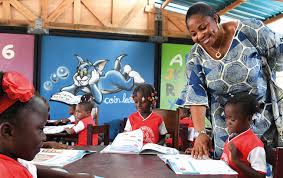A recent report from African leaders and the World Bank warns that the ongoing learning crisis could lead to a staggering $21 trillion loss in global productivity if not addressed urgently. This alarming statistic was shared during a conference at the UN General Assembly in New York, emphasizing that improving children’s education could generate an additional $6.5 trillion in global value by 2030.

The learning crisis is particularly severe in Africa, where nine out of ten children lack basic reading and math skills by age ten. Key findings reveal that four out of five children across the continent are unable to read proficiently. The African Union has recognized this crisis and is advocating for comprehensive reforms and innovative financing solutions to improve educational outcomes.
Moussa Faki, Chairperson of the African Union Commission, stressed the need for long-term strategies, urging member states to prioritize education. He highlighted that more than 80% of Africa’s future workforce will be youth, making foundational learning essential for sustainable development.
Former Zambian President Hakainde Hichilema echoed these concerns, stating that urgent investments in education are crucial as Africa’s youth population is expected to grow significantly by 2050. He noted that the current situation is unacceptable and called for collective action to ensure no child is left behind.
Dr. Joyce Banda, former President of Malawi, emphasized the need for accountability among leaders to uphold commitments made towards improving education. She argued that achieving educational goals is fundamental for the continent’s prosperity.
The discussions also highlighted successful initiatives that have shown promise in enhancing foundational learning outcomes. However, significant challenges remain, including inadequate funding and resource allocation. The average expenditure per child in Africa is significantly lower than the global average, which hampers progress.
As leaders call for immediate action to address this crisis, they stress that foundational learning is not just about academic success but also about unlocking the potential of millions of children who will shape Africa’s future. Without decisive measures, the continent risks losing out on its demographic dividend and exacerbating existing inequalities.



